A low carb protein powder can help you add muscle, drop fat, and control your hunger while avoiding the health problems that can come along with carb and sugar-laden protein powders.
The ideal low carb protein powder is one that tastes good, delivers a high dose of protein with a balanced amino acid profile, and does so without much in the way of carbohydrates and especially without added sugar.
Keeping the carbs low with the right protein powder can help you avoid the health consequences of excessive carbohydrates, like fat gain and poor metabolic health.
Fortunately for you, our research team has picked out the ten best low-carb protein powders on the market right now. Read on to see our rankings.
Research
Rankings
1. Ladder Whey Protein Powder
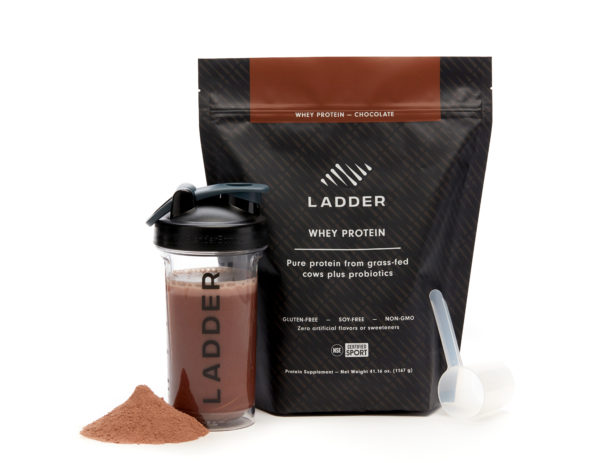
Ladder offers both animal and plant-based protein powder. Their whey protein is completely devoid of any unnecessary carbs, using only natural flavors and sweeteners to provide a smooth, delicious flavor.
Each serving contains a full spectrum of BCAAs, EAAs and probiotics to ensure optimal bioavailability and absorption. Since every batch is tested, and the entire line is NSF-certified, you can be confident that every serving is safe for even the most tested athletes.
2. Ancient Nutrition Bone Broth Protein
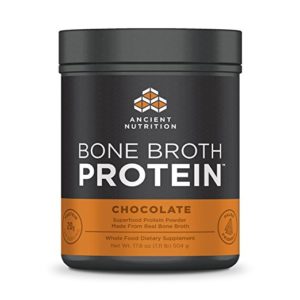
Ancient Nutrition uses chicken bone as its source of protein in this paleo-friendly protein powder. It’s flavored with cocoa powder, monk fruit extract, and stevia extract, which improve the taste without imparting any carbohydrates.
Each serving has only two grams of carbs, one of which is sugar. The protein content, as is the case with other bone broth protein powders, is very high—over 90% by weight.
Thanks to xanthan gum and guar gum, it also blends up pretty well in a protein shake. Compared to other bone broth and collagen protein powders, Ancient Nutrition is a little more comprehensive and user-friendly, making it a great choice.
3. Kiss My Keto Protein
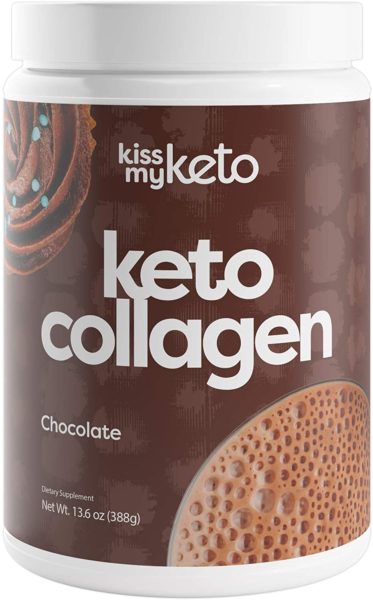
Kiss My Keto is a collagen-based protein powder that uses MCT oil to provide some healthy fat to burn for people who are on a ketogenic diet.
Unlike some other keto-friendly protein powders, Kiss My Keto makes this powder a little more user-friendly thanks to the cocoa powder, stevia extract, and natural flavors used to flavor the protein powder without adding anything in the way of carbohydrates.
With only three grams of carbohydrates, none of which are sugars, this is a very solid choice for a low-carb protein powder.
4. Transparent Labs Organic Vegan Rice and Pea Protein
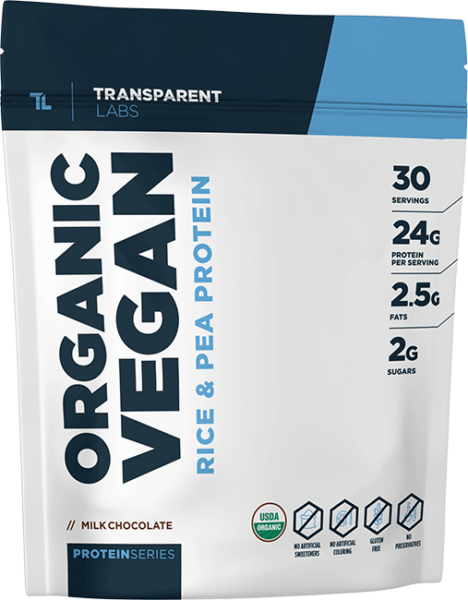
Click here for the lowest price
Transparent Labs makes a vegan-friendly low-carb protein powder that’s got a complete amino acid profile, thanks to a blend of both rice and pea protein. If you’re looking for low-carb protein that’s not derived from animal products it is a fantastic choice.
5. Natural Force Organic Whey
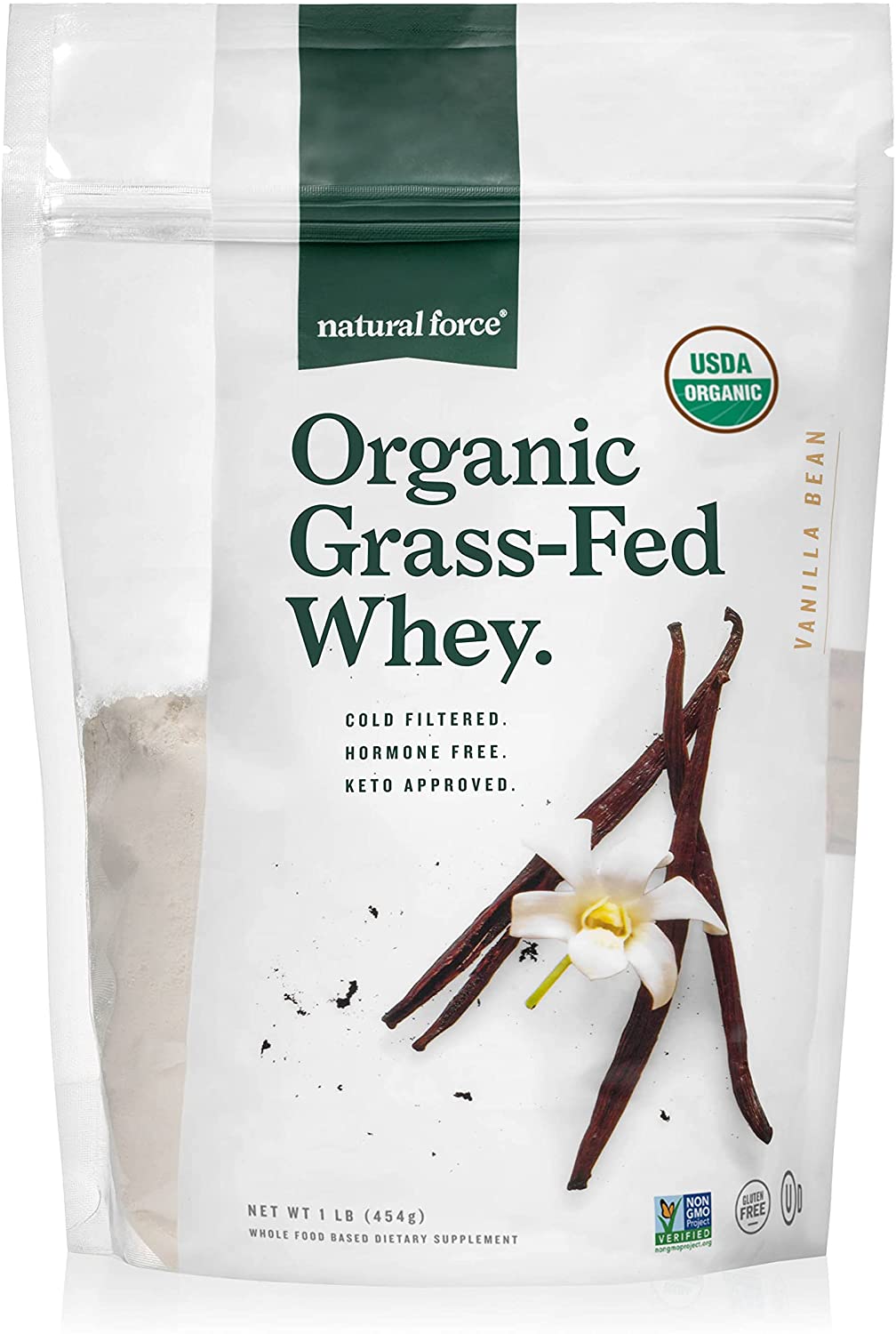
Natural Force takes quality seriously: this whey protein comes from grass-fed and ethically-treated cows, and all the major ingredients are organic. Add to that the sourcing of non-caloric sweeteners from monk fruit and real vanilla and you’ve got a great option for a low-carb protein powder that’s organically-certified.
6. Left Coast Performance Bone Broth Powder
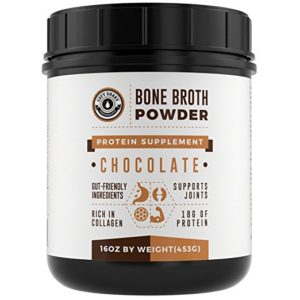
As long as animal protein is part of your diet, bone broth powder is one of the best ways you can get an extremely high protein intake while keeping the carbs low.
This protein powder is over 90% protein by weight, and it has only 3.5 grams of carbohydrates per serving—and less than a gram of that is sugar.
Left Coast Performance uses beef stock as the source for its protein, and the supplement is flavored with a mixture of stevia, monk fruit, and a small amount of cane sugar. While the carb content isn’t zero, fans of natural, high-purity protein will love Left Coast’s bone broth supplement.
7. Left Coast Performance Keto Protein Powder
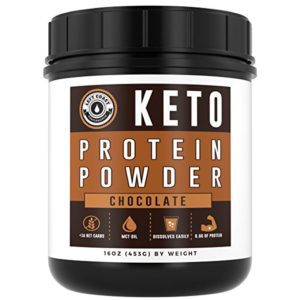
Left Coast Performance also makes one of the best keto-friendly protein powder out there, thanks to its simple ingredients, high protein content, and low carb content.
This protein supplement uses collagen powder as its protein source, plus its own proprietary MCT oil for fat-based energy.
It’s sweetened, but only with the natural and non-caloric sweeteners stevia and monk fruit extract. It’s an excellent choice if you want some extra fat energy in your low carb protein powder.
8. Perfect Keto Collagen
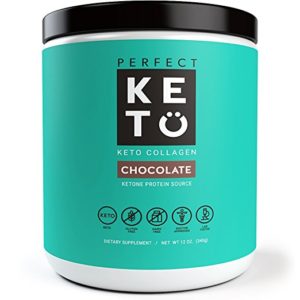
Formulated specifically for people who are on a ketogenic diet, Perfect Keto offers a protein supplement derived from animal collagen that is made up of a 2:1 blend of collagen powder and MCT oil.
This results in 10 grams of protein per 15 gram serving, along with four grams of fat from the MCT oil and one gram of carbohydrates.
It’s a very simple preparation, with no other ingredients aside from collagen and MCT oil. The only downside of this is that it’s a bit tricky to mix into a smoothie or a shake if you don’t have a blender.
9. Met-Rx Protein Plus
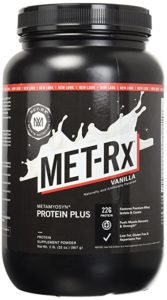
Met-Rx distinguishes itself by using a wide range of animal sources for its protein powder, including whey protein, casein protein, and egg white protein.
It has some L-glutamine added for a more balanced amino acid profile, and uses a mixture of natural and artificial flavors and sucralose for taste.
It’s not the most natural protein powder around, but it does have a low carbohydrate content and it tends to blend and mix up pretty easily thanks to the inclusion of soy lecithin and xanthan gum. Not the right match for purists, but it’ll get the job done for many people.
10. Designer Protein Lite Protein
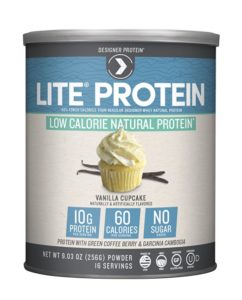
Designer Protein Lite Protein is specifically formulated for weight loss. It uses both whey and soy protein for its protein content, and sucralose as an artificial sweetener.
On the weight loss front, it also employs garcinia cambogia and green coffee bean extract, two popular weight loss supplements.
However, including these supplements is less than ideal, since you can’t precisely mete out the dosage like you could if you were taking them in a separate, dedicated weight loss supplement.
While the carb content is low (five grams per serving), the protein content is also fairly low (10 grams per serving), meaning that you’ll end up consuming a lot of carbs if you want a high protein intake with this supplement.
11. Primal Kitchen Primal Fuel
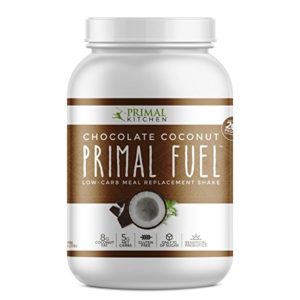
Primal Kitchen uses a combination of whey protein and coconut milk to create a protein powder that is high in both protein and in fat.
The high fat content would be good for users on a ketogenic diet, but due to the use of coconut milk, the carbohydrate content is actually fairly high, despite its billing as a low-carb-friendly product. Each serving has nine grams of fat, nine grams of carbohydrates, and 20 grams of protein.
Though the sugar content is low (only two grams per serving), strict low carb dieters might want to stick with a different protein powder.
Category winners
Best low carb protein powder overall: Ladder Nutrition Whey
Ladder was an easy choice for our top spot thanks to its high-quality ingredients, great taste, and low-carb formulation. It uses real cocoa powder and stevia for all-natural flavoring instead of relying on sugars like some of the competition. Whether you’re a strict keto dieter or just trying to cut out some carbs from your diet, it’s our recommendation for a low carb protein powder.
Best low carb vegan protein powder: Transparent Labs Organic Vegan Rice and Pea Protein
Transparent Labs makes a fantastic protein powder that’s our favorite when it comes to a vegan-friendly low carb protein powder. It’s got a full amino acid profile thanks to the use of both pea protein and rice protein, and its added carbohydrate content is zero, thanks to the use of organic cocoa powder and stevia for flavor.
Best low carb bone broth protein powder: Ancient Nutrition Bone Broth Protein
Ancient Nutrition specializes in paleo and keto-friendly products, and their bone broth protein is our favorite when it comes to a low-carb bone broth-based source of protein.
Best low carb protein powder for the keto diet: Ladder Whey Protein Powder
If you’re on the keto diet, there’s no better low carb protein option than Ladder. Their whey protein is augmented with whey protein isolate, and the flavoring adds nothing to the carb or sugar content, making it perfectly suited for keeping your protein intake on target without adding to your carbohydrate intake.
Best organic low carb protein powder: Natural Force Organic Whey
Natural Force is the way to go if you want organic, high-quality, and ethical protein that’s low in carbohydrates. Its whey protein comes from grass-fed and humanely treated cows, and it uses monk fruit and real vanilla extract to add flavor without adding carbs.
Best low carb protein powder with MCT oil: Kiss My Keto Protein
Kiss My Keto Protein is a keto-focused protein powder that uses bovine collagen as its primary source of protein, plus a hefty dose of medium-chain triglyceride oils for added ketogenic energy generation.
Who should buy low carb protein powder?
Low carb protein powder is great for most individuals and can help you lose weight and build muscle. It is exceptionally beneficial for diabetic’s who need to avoid blood sugar affecting nutrients like carbs.
If you are lactose intolerant or are avoiding animal products, make sure to pick a low carb, plant-based protein powder, as whey products don’t fit your goals and lifestyle.
Low carb protein powders don’t tend to interact with many medications, but it’s best to speak to your doctor if you are currently taking any medication, just to be safe.
How we ranked
When ranking the best low carb protein powders on the market, we first analyzed the type of protein used. Protein powder can come as whey, casein, plant-based, egg, or a mix of a few of them. For our rankings, whey was the preferred choice, due to its superfood status. That being said, plant-based protein like Performance Lab, did well because they provided a full spectrum of amino acids and purity.
Taste and flavoring were also important. Low carb proteins have gotten a bad rap for tasting bland, so we decided to source out only the best tasting ones. Beyond this, we only wanted products that flavored only using natural sources. This was because the long term research behind artificial sweeteners is not well known yet, so to be on the safe side, we ranked products that offered all-natural sweetening like Ancient Nutrition and Kiss My Keto highly.
Lastly, we looked at purity and certifications. A lot of reportable protein manufactures have been subject to scrutiny lately due to the amino spiking incident. Furthermore, a lot of companies fill their protein with less than ideal sources, such as soy and whey concentrate (not to be confused with whey isolate, which is the best choice). Products and companies that went about and beyond like Ladder and provided third-party lab testing results and NSF-certified designations were rewarded.
Benefits
Sugar-sweetened protein shakes and other beverages will make you more likely to gain fat. Given that the point of a protein shake is to cut fat and to gain muscle, this is not what you want.
Research published in 2006 by researchers at Harvard School of Public Health investigated the role of beverages sweetened with sugar in weight gain (1).
The review cited a number of studies connecting sugar sweetened beverage intake and weight gain—and this isn’t the kind of weight gain you want, which is more muscle and less fat. Sugary beverages, even if they have protein in them as well, promote fat gain.
The reason for this, according to the authors of this study, is related to both the negative metabolic effects of sugar, as well as the tendency of a sugar-sweetened beverage to leave you still feeling hungry after drinking it.
Protein will ameliorate this effect so some extent, but the fact remains that the fullness-inducing effect of a protein shake without sugar or carbs in it will be greater than that of a protein shake that has a high quantity of sugar or carbohydrates.
A low carb protein shake can keep you in ketosis. If you are on a ketogenic diet, you need to keep your carbohydrate intake extraordinarily low.
Most medical studies on ketogenic diets restrict carbohydrate intake to less than 20 grams of carbohydrates per day. A ketogenic diet with carbohydrate intakes this low can have tremendous benefit, even for people whose dietary habits have led them into very poor health.
Ketogenic diets are currently being researched as a treatment for many of the maladies associated with obesity, such as type two diabetes and nonalcoholic fatty liver disease.
One such study by researchers at Duke University Medical Center laid out the details and the result of a pilot study on using a ketogenic diet to treat nonalcoholic fatty liver disease (2).
Five subjects, all of them obese, underwent a six month ketogenic diet protocol that allowed only 20 carbohydrates per day. After six months, the average amount of weight lost was nearly 30 pounds (one subject lost 57 pounds).
Further, four of the five showed marked improvements in their liver function, with decreased inflammation and fibrosis in their liver cells.
If you’re aiming to follow a ketogenic diet like this, a regular protein supplement isn’t going to cut it. Often, flavoring and sweetening adds precious carbs to your daily intake, making it difficult or impossible to stay in a state of ketosis.
Low carb protein shakes can help with weight loss. Low carbohydrate diets aren’t just used to treat the consequences of excess body fat—they’re also useful for attacking the problem, and a low carb protein shake can play an integral role.
One study published in 2004 in the Annals of Internal Medicine described a clinical trial that compared a traditional low-fat diet to a low-carb diet in a group of 120 overweight patients who also had high levels of blood lipids (3).
The patients were randomly allocated to one of two diet plans: a traditional low-fat diet that aimed for less than 30% of daily calories coming from fat, or a low-carb diet with a strict 20 gram carb limit.
Though both groups dropped body fat, the low carb diet group dropped almost double the amount of body fat over the six-month duration of the study: 11 pounds of fat on average in the low fat diet group, and 21 pounds of fat in the low carb diet group.
In addition, the low carbohydrate diet led to a greater reduction in blood triglyceride levels, a known risk factor for cardiovascular disease.
Protein shakes are known to help with weight loss. A low carb diet plus a low carb protein powder is a recipe for weight loss success.
Research published in 2008 in the journal Nutrition & Metabolism studied the effects of adding a whey protein supplement or a placebo supplement to the weight loss regimen in a group of obese volunteers (4).
The researchers found that the whey protein supplement resulted in greater amounts of body fat lost, and a greater preservation of lean body mass (i.e. muscle), than the placebo supplement, which had an equal amount of calories but was not a protein supplement.
Side effects
As protein supplements are merely a concentrated source of what’s in standard sources of dietary protein, there are virtually no side effects associated with low carb protein powder.
The only caveat to this is whey or casein protein in people with lactose intolerance or dairy allergies.
While people with mild lactose intolerance can usually handle dairy-derived protein supplements, people with more severe lactose intolerance or a dairy allergy should opt for a lactose-free protein powder.
Recommended dosage
For athletes in training, the protein recommendations are fairly straightforward: 1.2 to 1.4 grams of protein per kilogram of body mass per day for endurance athletes, and 1.4 to 1.8 grams of protein per kilogram of body mass for power, speed, and strength athletes (5).
For weight loss, the story is a little more complicated: so far, studies have used between 20 and 50 grams of protein per day for weight loss and weight maintenance.
These guidelines are remarkably effective; studies have consistently found that they are effective at promoting weight maintenance after weight loss (6, 7).
FAQ
What is a low carb protein powder? A low carb protein powder provides you with a highly concentrated source of protein that avoids using carbohydrates and especially sugars to sweeten or flavor the supplement. Many traditional protein powders or mass gainers rely heavily on carbohydrates as a sweetener or a source of calories.
If you are following a keto diet, or if you are trying to keep your carb and sugar intake low, these more traditional protein powders can foul up your plans. Go for a low carb protein powder instead.
Can low carb protein powders help with weight loss? While protein powder should not be used as a meal replacement to lose weight, the addition of a low carb protein powder can both help aid with weight loss.
Can I take low carb protein powder if I am on medication? There are no known interactions between low carb protein powder and medications. If you are consistently taking medications, please consult your doctor before adding any supplements to your diet.
Can I use low carb protein powder if I am diabetic? Refined carbohydrates, especially added sugars could cause a blood sugar spike in those with diabetes. One 2003 study has shown that the addition of protein powder to the diet of diabetics can have a positive impact on health (8).
Low or no-carb protein powder would be the ideal choice for a diabetic, as long as there are no added refined sugars in the powder. Protein powder is also a snack that can be kept with you and taken on the go, so that’s a great option for diabetics, instead of having to grab something quickly that likely has a lot of sugar in it.
Does low carb protein powder go bad? Most protein powders have a best before date, but since it’s a dry powder, there is very little risk of bacteria growth. A sealed container of powder may be good for years after the best before date. An open container would be good for likely six to eight months after the best before date.
However, it’s suggested that you consume the powder before the best before date as it may lose its potency over time.
Is low carb protein powder good for you? Depending on your goals and diet, a low carb protein powder can be an excellent addition to your routine. If you find that you are not reaching your protein goals through diet alone, or you are very active, or you are on the keto diet, a low carb protein powder can supplement the protein you’re getting from food to make sure you’re achieving optimal results.
What is the best brand of low carb protein powder? There are many popular brands that produce low carb protein powder. Choosing the best brand for you will be a personal choice depending on what kind of protein you want, the taste, and the ingredients.
Some of the most popular products on the market include Impact Whey Protein – Salted Caramel, Nature’s Best Zero/Low Carb Isopure Creamy Vanilla, Myprotein Canada Clear Whey Isolate – Lemonade, Vega Protein Powder Protein & Greens Vanilla, and Bodybuilding.com Signature 100% Whey Protein Powder Vanilla. Our top choice is Ladder whey protein.
How do I know which low carb protein powder is right for me? Choosing a low carb protein powder will be based on your goals and which protein derivative you wish to consume. Speaking with a dietician is beneficial because they are trained to help you with your goals. If you are looking to lose weight, or are lactose intolerant, your low carb protein powder would likely be different than an avid gym-goer who is looking to bulk up.
Can I take low carb protein powder if I am taking other supplements? There are no known interactions between low carb protein powder and other supplements. If you are consistently taking other protein supplements, please consult your doctor before adding any supplements to your diet. There can be very distressing effects of overloading your body with protein for a prolonged period of time.
Is low carb protein powder suitable for children? Children should not be taking protein powder or other protein supplements unless otherwise directed by their doctor. They should be receiving all the protein they need through a balanced diet, and they don’t need nearly as much as an adult.
Is it okay to use low carb protein powder in cooking? There are many recipes that utilize low carb protein powder to help people deliciously achieve their protein goals. It can be a great way to get in some extra protein if you don’t like powder mixed with water. As long as you are not overconsuming protein on a consistent basis, you are fine to make recipes with low carb protein powder.
What happens if I take too much low carb protein powder? If you over-consume low carb protein powder, you may feel some discomfort like dehydration, nausea, indigestion, exhaustion, diarrhea, feelings of irritability, or headache.
There’s not much concern when you consume too much protein once in a while, but if you are consistently taking in more than 2 grams per kilogram of body weight, you can put yourself at risk for liver and kidney issues, seizures, cardiovascular disease, blood vessel disorders, or even death.
You could also develop cancer, osteoporosis, or type 2 diabetes. Even if you are an active individual, you should consult a medical professional like your doctor or a dietician to ensure you’re taking in the appropriate amount of protein.
What does low carb protein powder taste like? There’s a wide variety of tastes that accompany low carb protein powders. Whey protein will taste different than plant-based protein powders, but they are all meant to taste good. There are a variety of flavors that are available for you to find something you enjoy.
Many health food stores will offer samples of protein powders, so you can taste the texture and flavor before you buy a tub.
Is low carb protein powder suitable for pregnant or breastfeeding women? There is evidence to show that pregnant women may have higher protein needs as their pregnancy progresses, so a protein powder supplement would be ideal. Please consult your doctor before taking any supplements during pregnancy.
Can I have low carb protein powder if I am lactose intolerant? If you are looking for a low carb protein powder and you are lactose intolerant, you will want to avoid choosing a whey or casein powder. Both of these are derived from dairy and can negatively impact those who are intolerant. There are other options that include plant-based proteins like pea or soy-based proteins.
How does low carb protein powder improve athletic abilities? Protein works to build muscle, help you recover faster after workouts, and it’s an essential nutrient. Those individuals who are looking to grow their size can include extra protein in their diet to help. Active individuals should typically have between 1.1 and 1.7 grams of protein per kilogram, but they should never exceed 2 grams per kilogram of body weight per day.
How much low carb protein powder can I have on a daily basis? Low carb protein powder is intended to be a supplement to your balanced, nutritious diet. When taking a supplement, you want to ensure you know your personal protein goals per day. Everyone has different needs, but the ideal amount you should be consuming is 10 to 35 percent of your daily calories should come from protein.
The RDA for adults is 0.8 grams per kilogram of body weight. Depending on the level of activity you get or how sedentary you are, you may require more. As we age, we require more protein. Older and active individuals can require closer to 1 to 1.7 grams of protein per kilogram of body weight.
An example is if you happen to weigh 165lbs, you’d aim to consume 60 grams of protein per day. Most protein powders contain between 20 and 25 grams per serving, so if you are doing well with your diet, you may be taking 1-2 servings per day.
How much water should I mix my low carb protein powder with? Each protein powder on the market may have a different set of instructions, so please read and follow the label. You may opt to add more water or use less water, depending on your preference and taste.
When should I take low carb protein powder? A low carb protein powder supplement should be consumed 45 minutes to an hour after a workout or as a snack to help meet protein goals.
Can I use low carb protein powder as a meal replacement? Low carb protein powder is not intended to be used as a meal replacement. Protein is best consumed with fruits, vegetables, and whole grains.
What happens if I’m allergic to low carb protein powder? While allergies to protein powders are rare, if you start to feel dizzy, nauseated, start to swell in the face, throat, or tongue, or develop a skin rash or hives, you may be allergic to an ingredient in the powder. If you start to feel any of these symptoms, please seek immediate medical attention.
Which low carb protein powders are keto-friendly? The protein powders that are keto-friendly include whey protein, casein protein, collagen protein, egg protein, rice protein, pea protein, and soy protein.
Related Articles
- Protein powders for weight loss
- Best tasting protein powders
- Paleo protein powders
- Blood sugar
- Weight loss programs
- Whey protein
Recap
Low carb protein powders are the perfect solution if you want to maintain a low carb diet and keep your protein intake up.
High protein intake is useful both for athletic performance, where it aids in muscle recovery and strength gain, as well as in weight loss, where high protein intake leads to greater fat loss, better maintenance of lean body mass, and a greater likelihood of keeping weight off after you’ve lost it.
For BodyNutrition’s #1 recommended low carb protein powder, click here.